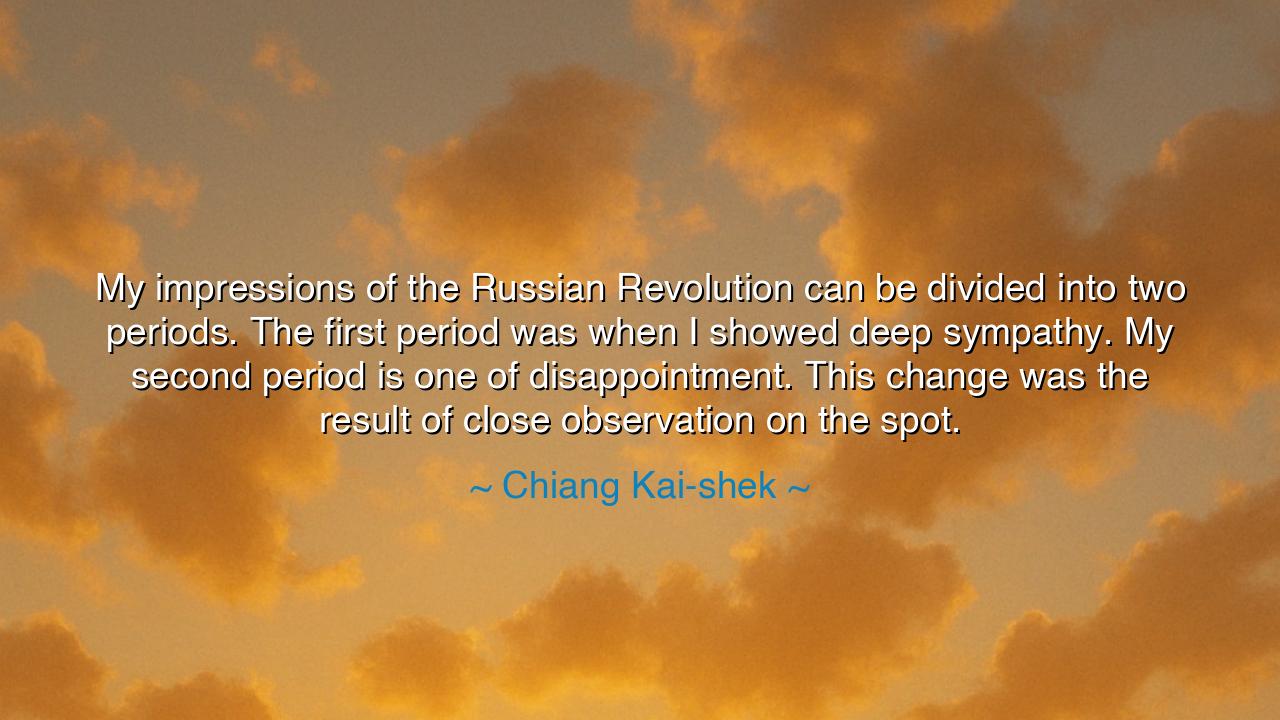
My impressions of the Russian Revolution can be divided into two
My impressions of the Russian Revolution can be divided into two periods. The first period was when I showed deep sympathy. My second period is one of disappointment. This change was the result of close observation on the spot.






"My impressions of the Russian Revolution can be divided into two periods. The first period was when I showed deep sympathy. My second period is one of disappointment. This change was the result of close observation on the spot." These words, spoken by Chiang Kai-shek, reflect the journey of a man who once held hope and sympathy for a cause, only to be swayed by the harsh realities that accompanied it. Chiang, a leader who played a pivotal role in the history of China, speaks to the evolution of his understanding of the Russian Revolution, from an initial optimism to a profound sense of disillusionment. His personal transformation highlights the importance of close observation, the ability to see beyond the idealism of a movement, and the courage to confront the truth as it presents itself.
In the first period of his impressions, Chiang was likely swept up in the romanticism and idealism that often surrounds revolutionary movements. The Russian Revolution, which sought to overthrow the tsarist monarchy and establish a new order based on equality and justice, inspired many across the world. The vision of a new world—one where the oppressed could rise up and claim their power—was compelling. For Chiang, like many others of his time, there was a deep sympathy for the revolutionaries' struggle against an oppressive system, and an expectation that this struggle would lead to a better, more just society.
However, Chiang’s second period of disappointment reveals a deeper truth about revolution and human nature. Upon witnessing the aftermath of the revolution and its execution on the ground, his view shifted dramatically. The revolution that began with so much promise and idealism often gave way to the harsh realities of totalitarianism, oppression, and violence. The Bolshevik leaders, initially hailed as champions of the working class, were soon seen by many, including Chiang, as increasingly ruthless in their consolidation of power. The purges, the oppression of dissent, and the rise of a new ruling elite under Lenin and later Stalin led to a sense of betrayal. The ideals of the revolution seemed to have been corrupted by the very structures of power it sought to dismantle.
This shift in Chiang’s perspective mirrors a larger truth in the history of revolutions. Revolutionary ideals can often be overshadowed by the pragmatic realities of power. Consider the story of Napoleon Bonaparte, who rose to prominence during the French Revolution, initially as a defender of republican ideals but eventually crowned himself emperor. His journey is a testament to the dangers of power unchecked by the very principles that once motivated it. In time, Napoleon became a figure not of liberty, but of autocracy, symbolizing how even the most seemingly righteous causes can be twisted when power becomes the driving force.
Chiang’s disappointment serves as a reminder that the path to revolutionary change is fraught with peril. While the vision of a better world may inspire many to fight, the practicalities of bringing about such change often result in compromises that can betray the very essence of the movement. The Russian Revolution, like many before and after it, illustrates the tension between idealism and the harsh reality of building a new social and political order. The struggle for justice can easily become corrupted when the forces of power take over, and the oppressed can become the oppressors, as history so often shows.
The lesson that Chiang Kai-shek’s words offer is one of vigilance and reflection. It is easy to be swept away by the rhetoric of revolution, by the promise of a new order. But true understanding comes only through close observation—through watching the way in which ideals play out in the real world, not just in the speeches of leaders but in the lives of the people. As individuals, we must always question whether the changes we seek will truly lead to a better future or whether they will be shaped by the very flaws we sought to eliminate. The world is often not changed by a single event or revolution, but by the small, steady actions of those who remain committed to the principles of justice and humanity.
In practical terms, this means that we must constantly evaluate the movements we support, the leaders we follow, and the revolutions we partake in. Idealism alone is not enough to change the world; it must be paired with a deep awareness of human nature and the complexities of power. We must look beyond the surface and ask ourselves, "What will this truly lead to? Will it create a society that reflects the values we cherish, or will it simply repeat the same mistakes of the past?" It is through this careful observation and reflection that we can contribute to positive change, not driven by blind loyalty, but by a commitment to truth and justice.
Thus, let us take Chiang Kai-shek's journey from sympathy to disappointment as a cautionary tale and a call to action. Let us recognize that the road to a better world is often more complicated than it first appears. It is not enough to desire change; we must be vigilant in our pursuit of it, ensuring that the ideals that inspire us are never lost in the machinery of power. And as we continue on our own paths, may we always remember that true progress comes not from mere revolution, but from reflection, understanding, and the steadfast pursuit of justice for all.






AAdministratorAdministrator
Welcome, honored guests. Please leave a comment, we will respond soon